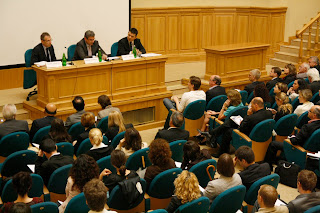
The study visit is a new activity in the current phase of TRIALOG, which foresees annual study visits for a group of CSO representatives from selected NMS platforms.
This year, the two neighbouring platforms, the Bulgarian Platform for International Development (BPID) and the Romanian NGDO Platform (FOND) took part in a study visit to the European Union institutions in Brussels, organised by TRIALOG during the 12th and 16th July 2010.
The study visit’s goal was to help the participants get better understanding about main EU institutions and how to better interact with them in fulfilling the platforms’ tasks. The programme included meetings with representatives of the European Economic and Social Committee, the Development Committee of the European Parliament, DG Dev and DG EuropeAid of the European Commission and the Bulgarian and Romanian Permanent Representations in Brussels, which increased the knowledge of the participants on the European development policy and on the advocacy role of NGDOs. There were free hours provided so each of the groups had separate meetings with their country representatives based in Brussels.

As one of the main highlights of the visit, the participants were able to observe a meeting of the Development Committee, which was also attended by the EU Commissioner, Mr. Andris Piebalgs, providing a very useful insight on the dynamics and interaction between the representatives of the two institutions.
Overall the study visit increased the participants’ understanding of the EU development policies, with focus on current important issues (such as the European Transition Compendium, the Eastern Partnership Civil Society Forum, the DEAR Study…) and provided useful contacts for them. Also, it emphasized the need for further strengthening of the policy/ advocacy capacity of the two platforms to engage more actively in development cooperation at the European level. The visit gave additional and practical information on the activity of TRIALOG, CONCORD and DEEEP.
As for concrete follow-up activities, the participants of the two platforms will disseminate the report of the study visit among the platform members, elaborate thematic dossiers for the member NGOs (on the ETC, European institutions in development cooperation, EDF, ENPI…), follow-up with the people met during the study visit and encourage platform members to become more active at the European level.
The report of the study visit will be available shortly on the TRIALOG website.
Information provided by Adela Rusu, FOND, and Dimitar Sotirov, BPID
 The study visit is a new activity in the current phase of TRIALOG, which foresees annual study visits for a group of CSO representatives from selected NMS platforms.
The study visit is a new activity in the current phase of TRIALOG, which foresees annual study visits for a group of CSO representatives from selected NMS platforms. As one of the main highlights of the visit, the participants were able to observe a meeting of the Development Committee, which was also attended by the EU Commissioner, Mr. Andris Piebalgs, providing a very useful insight on the dynamics and interaction between the representatives of the two institutions.
As one of the main highlights of the visit, the participants were able to observe a meeting of the Development Committee, which was also attended by the EU Commissioner, Mr. Andris Piebalgs, providing a very useful insight on the dynamics and interaction between the representatives of the two institutions. 












